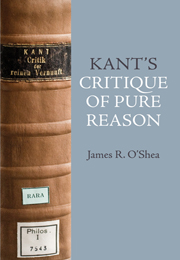Book contents
- Frontmatter
- Contents
- Preface
- INTRODUCTION
- 1 METAPHYSICS AND THE “FIERY TEST OF CRITIQUE”
- 2 WAKING FROM DOGMATIC SLUMBERS: HUME AND THE ANTINOMIES
- 3 SPACE AND TIME AS FORMS OF HUMAN SENSIBILITY
- 4 THE CATEGORIES OF UNDERSTANDING AND THE THINKING SELF
- 5 ONE LAWFUL NATURE
- 6 CONCLUSION: PURE REASON'S ROLE IN KANT'S METAPHYSICS OF NATURE
- Bibliography
- Index
2 - WAKING FROM DOGMATIC SLUMBERS: HUME AND THE ANTINOMIES
- Frontmatter
- Contents
- Preface
- INTRODUCTION
- 1 METAPHYSICS AND THE “FIERY TEST OF CRITIQUE”
- 2 WAKING FROM DOGMATIC SLUMBERS: HUME AND THE ANTINOMIES
- 3 SPACE AND TIME AS FORMS OF HUMAN SENSIBILITY
- 4 THE CATEGORIES OF UNDERSTANDING AND THE THINKING SELF
- 5 ONE LAWFUL NATURE
- 6 CONCLUSION: PURE REASON'S ROLE IN KANT'S METAPHYSICS OF NATURE
- Bibliography
- Index
Summary
[B]y an unavoidable law of nature the question ‘Why?’ will pursue you, and require you to go beyond this point …
(A488/B516)This sort of investigation will always remain difficult, for it includes the metaphysics of metaphysics.
(Letter to Herz, 1781)HUME'S SCEPTICISM AND THE PROBLEM OF SYNTHETIC A PRIORI JUDGMENTS
In a famous passage from the Prolegomena to any Future Metaphysics (1783), a shorter (but no less difficult) book in which Kant attempted to restate the central themes of his Critique of Pure Reason, Kant writes that it was in fact his taking in points made by the Scottish philosopher and moderate sceptic David Hume that stimulated the ‘critical’ revolution in his own thinking (cf. A758–69/B786–97):
I freely admit that it was the admonition by [or remembrance of: Erinnerung] David Hume that was the very thing that many years ago first interrupted my dogmatic slumber and gave a completely different direction to my researches in the field of speculative philosophy.
(Prolegomena, 4:260)(On the translation of ‘Erinnerung’, see Beck [1969: 439]; Guyer [2008: 1].) One of the main aims of the Critique of Pure Reason, as we have seen, is to demonstrate that speculative metaphysics has never been based on a sufficiently self-critical prior scrutiny of the essential nature and limits of human reason itself. From this critical perspective Kant characterizes the philosophical doctrines of so-called pre-Critical rational metaphysicians as dogmas of pure reason, and he gives the otherwise estimable thinkers who defended such doctrines the unflattering title of dogmatists (Aix-x; cf. Bxxxv).
- Type
- Chapter
- Information
- Kant's Critique of Pure ReasonAn Introduction and Interpretation, pp. 40 - 77Publisher: Acumen PublishingPrint publication year: 2011



